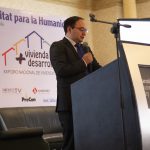Smokeless Stoves: Abelina Roquel Tuy and Marcela Guit Roquel

Abelina Roquel Tuy
“I like everything about the new stove,” exclaims Abelina Roquel Tuy. “I haven’t had any more health problems.”
Abelina can be found in the yard of her home, waving and directing her children with one hand and weaving elaborate textiles with the other. She speaks rapidly in Kaqchikel, a Mayan dialect, and her face glows with eagerness. “I thank God for the projects Habitat for Humanity Guatemala has brought to us, for all of the work that they have come to do. That has made all of the difference in how I cook.”
Asking how her new smokeless stove was built, Abelina Roquel Tuy’s face breaks out into a grin. “My children helped cut fifty blocks in one day,” she boasts proudly. “I still remember the group that came to help, they brought many blessings with them. They worked so hard when they came to help us. Each time I light this stove, I think of them.”
Abelina, her husband, José, and their five children reside in a community neighboring la Cuchilla, a turnoff that heads into the department of Sololá. Decades of living in the area has allowed them to develop strong relationships with their neighbors. Those neighbors were the ones who suggested a smokeless stove to Abelina, who for decades, had been cooking with a defunct stove. “Our old stove was made from two blocks and a few bars of iron, nothing more,” Abelina describe. “We used this way for thirty years.”

However, her neighbors had a solution, “Thanks to another woman living in the community, who had worked extensively with promoters for Habitat for Humanity Guatemala, she told me about their projects and asked if I wanted to participate, particularly with the smokeless stove,” she recalls. “That was five months ago.”
The stove also caused several problems. “The smoke was difficult for us. We had headaches, and the smoke made us cough,” she describes. “Now, we’re not affected by anything.” Abelina says that she was concerned, above all, for the wellbeing of her children. “They used to suffer so much, and I had to buy them expensive medicine. My food would come out smoky, and my children refused to eat it, because the smell was so strong.” However, that has since changed. “Now, they eat everything,” she laughs.
Fuel has become more efficient for Abelina and her family. Living in a remote area can be difficult at times. “We usually buy wood, although on occasion, we’ll burn corn stalks from the fields. Before, half of a bundle of wood lasted a week, and it cost us 100Q ($13.00),” says Abelina.
However, the smokeless stove consumes less, and it has allowed Abelina to save a significant “Now, it’s half of that. We spend 50Q a week, although now, we can also just buy pieces for 1Q each, and that lasts us a week. We can buy extra food with what we save.”
Marcela Guit Roquel
“We got along well and had a lot in common. We wanted to communicate, but we didn’t speak the same language. But it was good, because we were able to share moments where we connected together here on the patio. I loved their spirit.”
On a damp and overcast day, Marcela Guit Roquel tells anecdotes while warming herself by her new Habitat for Humanity Guatemala smokeless stove. A small puppy curls up under her seat, its eyes reflecting the orange light of the coals. The people that she describes are the group of international volunteers, who helped her build the new stove. “It took a day to construct,” she says. “The group, they are great people. I still have photos of them on my phone that I took of them.”
Marcela expresses how sitting by her stove is a new luxury, one that she had never known before. “I was cooking the ground,” she recollects in Kaqchikel, a local Mayan dialect distinctive of Sololá in Guatemala. “I didn’t have a grill, and a lot of smoke leaked out of it. It affected me most with my eyes and burned me because of the heat. I bought medicines in the community, but because of the distance, I couldn’t go a lot.”

The new stove has made all the difference by transforming Marcela’s life, providing her with numerous benefits. “I like that I can cook everything at the same time and that it heats up faster,” she says. “I also don’t have to look for wood as much. With the extra time, I have greater flexibility in going to market and buying food.”
In conclusion, Marcela expresses that she has nothing but gratitude in her heart. “Thank you. I am very grateful to Habitat, to the volunteers. Thanks to them, I have left all of my problems and the smoke behind. I have no more words to say aside from thank you.”



